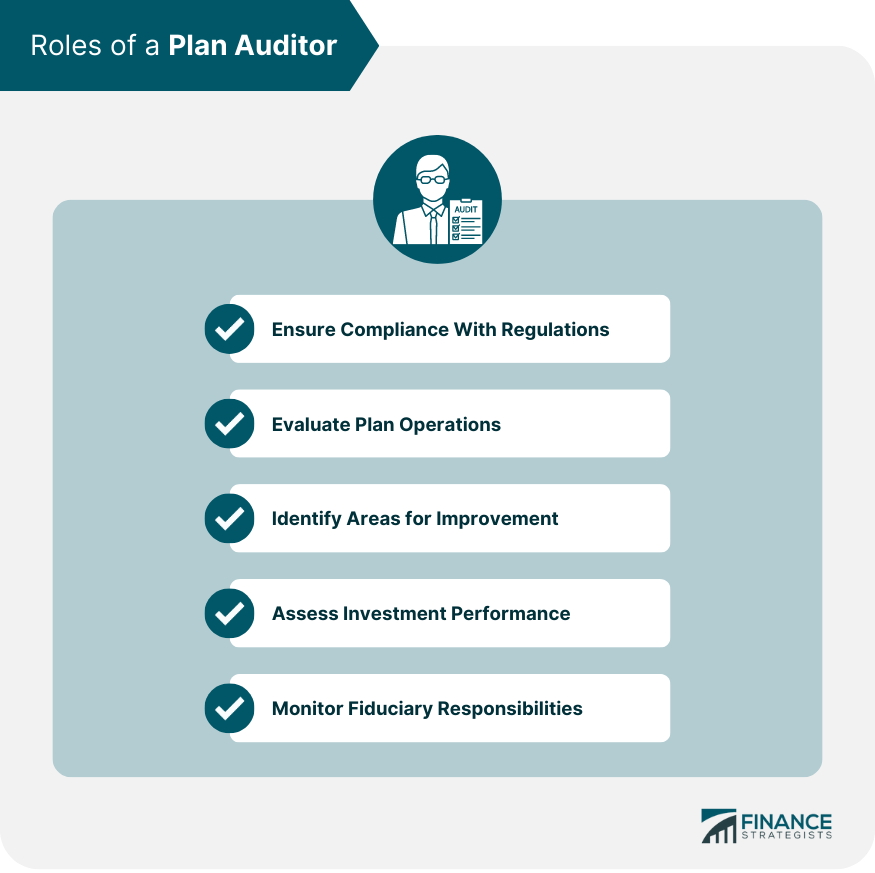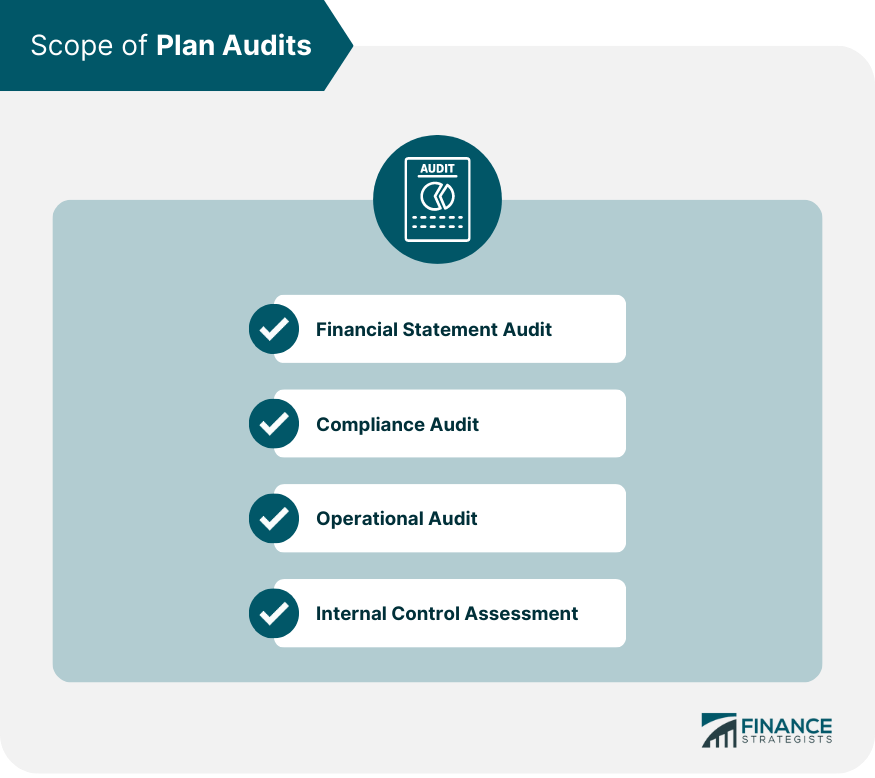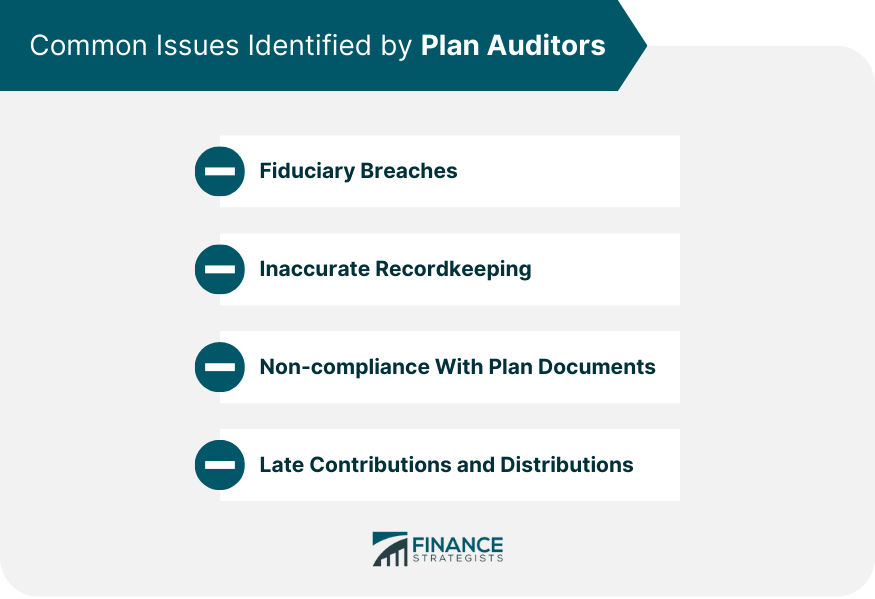A plan auditor is a professional who performs audits of retirement plans to ensure compliance with various regulations and laws, as well as the plan's own terms and conditions. Retirement plan audits are typically conducted by certified public accountants (CPAs) or other professionals who are authorized to perform such audits. The auditor will typically review the plan's financial statements, investment policies, and compliance with regulations, such as the Employee Retirement Income Security Act (ERISA) and the Internal Revenue Code. The auditor will also review the plan's operations to ensure that the plan is being administered properly and that the plan's assets are being managed prudently. This includes reviewing the plan's internal controls and testing the accuracy and completeness of the plan's records. Retirement plans are subject to various rules and regulations, such as the Employee Retirement Income Security Act (ERISA) and the Internal Revenue Code (IRC). Plan auditors help ensure that the retirement plans adhere to these regulations, protecting both the plan sponsor and participants from potential legal issues and penalties. Plan auditors assess the operational aspects of retirement plans, including record-keeping, contributions, distributions, and loan processes. They review plan documents, financial statements, and participant records to identify any discrepancies or errors that may affect the plan's overall performance. By conducting thorough plan audits, auditors can identify potential areas for improvement in plan administration or investment strategies. These recommendations can enhance the plan's effectiveness, which may ultimately result in higher retirement savings for participants. Plan auditors also evaluate the performance of the plan's investments, ensuring they align with the stated investment policy and objectives. They may recommend changes to the investment lineup or adjustments to the plan's asset allocation to optimize returns and manage risk. Retirement plan sponsors have fiduciary responsibilities to act in the best interest of plan participants. Plan auditors help ensure that these responsibilities are met by reviewing plan governance, fee structures, and the selection of service providers, among other factors. When choosing a plan auditor, it is essential to consider their experience and credentials. Look for a Certified Public Accountant (CPA) with specific expertise in employee benefit plan audits. A plan auditor's reputation and track record are important factors to consider. Seek out auditors with a history of conducting thorough, accurate, and timely audits. Ask for recommendations from colleagues and industry professionals and consult online reviews to find a plan auditor with a strong reputation. Plan audits generally cover four main areas: financial statement audits, compliance audits, operational audits, and internal control assessments. This type of audit focuses on verifying the accuracy and completeness of the plan's financial statements. A compliance audit evaluates the plan's adherence to regulatory requirements, including employee contributions, employer contributions, distributions, and prohibited transactions. Operational audits assess the plan's overall performance and efficiency, examining areas like investment management, recordkeeping, and participant communication. This assessment evaluates the effectiveness of the plan's internal controls, aiming to identify potential weaknesses that could lead to errors or fraud. The audit process typically involves three main phases: pre-audit, fieldwork, and reporting. During this phase, the auditor prepares an engagement letter and audit plan, outlining the scope and objectives of the audit. They also collect and review relevant data and documentation. The fieldwork phase involves testing procedures, identifying issues, and addressing any concerns with the plan's management. During this phase, the auditor conducts tests to verify the accuracy and completeness of the plan's financial and operational data. They also identify any issues or discrepancies and work with the plan's management to address these concerns. Once the fieldwork is complete, the auditor prepares a draft audit report, which outlines their findings and recommendations. The plan's management then has an opportunity to respond and develop action plans to address any identified issues. Finally, the auditor issues a final audit report, which is shared with relevant stakeholders. Plan auditors may uncover a variety of issues during the audit process, including: Fiduciary breaches occur when plan sponsors or other fiduciaries fail to act in the best interest of the plan's participants. Errors in participant data, contributions, or investment allocations can lead to significant issues in plan administration and compliance. Failure to follow the plan's provisions, as outlined in its governing documents, can result in regulatory penalties and legal liabilities. Timely processing of contributions and distributions is essential to ensure compliance with regulations and maintain the plan's tax-qualified status. Conducting regular plan audits offer several benefits: Regular audits help ensure that the plan remains compliant with applicable laws and regulations, minimizing the risk of penalties or sanctions. By identifying and addressing potential issues early, plan audits can help minimize the financial and legal risks associated with non-compliance or fiduciary breaches. Audits can reveal opportunities to improve the plan's investment performance, operational efficiency, and participant communication, ultimately leading to better outcomes for plan participants. Regular audits show plan sponsors and other fiduciaries are taking their responsibilities seriously, acting in the best interest of plan participants, and maintaining a high standard of care. Plan auditors play a critical role in retirement planning by ensuring compliance with regulations, evaluating plan operations, identifying areas for improvement, assessing investment performance, and monitoring fiduciary responsibilities. The audit process typically involves financial statement audits, compliance audits, operational audits, and internal control assessments. Common issues identified during audits include fiduciary breaches, inaccurate recordkeeping, non-compliance with plan documents, and late contributions and distributions. Regular plan audits offer numerous benefits, such as ensuring regulatory compliance, minimizing risks, enhancing plan performance, and demonstrating fiduciary responsibility. Overall, plan auditors are a critical component in responsible retirement planning and administration.What Is a Plan Auditor?
Roles of a Plan Auditor

Ensuring Compliance With Regulations
Evaluating Plan Operations
Identifying Areas for Improvement
Assessing Investment Performance
Monitoring Fiduciary Responsibilities
Selecting a Plan Auditor
Experience and Credentials
Reputation and Track Record
Recommendations and Referrals
Scope of Plan Audits

Financial Statement Audit
Compliance Audit
Operational Audit
Internal Control Assessment
Plan Audit Process
Pre-Audit Phase
Fieldwork Phase
Reporting Phase
Common Issues Identified by Plan Auditors

Fiduciary Breaches
Inaccurate Recordkeeping
Non-compliance With Plan Documents
Late Contributions and Distributions
Benefits of Regular Plan Audits
Ensuring Compliance with Regulations
Minimizing Financial and Legal Risks
Enhancing Plan Performance and Efficiency
Demonstrating Fiduciary Responsibility
Final Thoughts
Plan Auditor FAQs
A plan auditor is responsible for conducting audits of retirement plans to ensure their financial accuracy, compliance with regulations, operational efficiency, and overall performance. They play a vital role in maintaining the integrity of retirement plans and helping plan sponsors and fiduciaries meet their obligations.
A plan auditor assesses the accuracy of contributions, evaluates distribution procedures, and verifies that the plan adheres to all applicable regulations. This may include reviewing employee and employer contributions, ensuring timely processing of contributions and distributions, and identifying any prohibited transactions.
A qualified plan auditor should be a Certified Public Accountant (CPA) with specific expertise in employee benefit plan audits. In addition to their professional certifications, it is crucial to consider their experience, reputation, and track record in conducting retirement plan audits.
A plan auditor typically covers four main areas during an audit: financial statement audits, compliance audits, operational audits, and internal control assessments. These areas help ensure the plan's accuracy, compliance, performance, and overall efficiency.
Regular plan audits can benefit a retirement plan by ensuring compliance with regulations, minimizing financial and legal risks, enhancing plan performance and efficiency, and demonstrating fiduciary responsibility. By identifying and addressing potential issues early, plan audits can help protect the plan's tax-qualified status and contribute to better outcomes for plan participants.
True Tamplin is a published author, public speaker, CEO of UpDigital, and founder of Finance Strategists.
True is a Certified Educator in Personal Finance (CEPF®), author of The Handy Financial Ratios Guide, a member of the Society for Advancing Business Editing and Writing, contributes to his financial education site, Finance Strategists, and has spoken to various financial communities such as the CFA Institute, as well as university students like his Alma mater, Biola University, where he received a bachelor of science in business and data analytics.
To learn more about True, visit his personal website or view his author profiles on Amazon, Nasdaq and Forbes.















